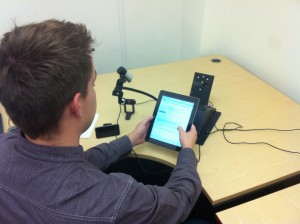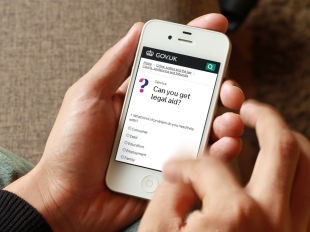We’re developing a tool letting people work out if they can get legal aid (help paying for legal advice) which we've just tested with users.
The tool, called Can you get legal aid?, asks questions about their type of problem and finances, and is similar to ‘smart answers’ on GOV.UK, like our guide to inheritance rules.
Our developers built the tool in-house, drawing on GDS open source code and design principles.
We’ve used an agile approach, starting with a simple early prototype to test with users.
Digital consultancy Reading Room carried out the user testing with 12 people in London and Manchester in December.
Users were given scenarios in which they might need legal aid, and asked to think of their own, to see if they could use the tool to get help.

The feedback was overwhelmingly positive, and 81% of users successfully completed the tasks.
One user said they were impressed as they “didn’t know it was so simple”.
They liked the mobile version as much as, if not more than, the desktop one – important given more and more of us have smartphones.
(To find out more about this, have a look at Reading Room’s blog on the mobile usability testing.)

We also received plenty of suggestions for improvements.
Some users were confused by some of the language – words like ‘mediation’, ‘discrimination’ or ‘debt’.
Most of the text is plain English, but we need to do more to explain some unclear terms.
Many users also wanted more information about why they weren’t entitled to legal aid.
We made several small improvements to the tool in the few days between the user testing sessions, which solved some of these problems, and made a significant difference to the results.
The user testing indicates that the public will find the tool helpful, and has been invaluable in pointing out problems ahead of launch.
We’ll be refining the tool, getting more feedback from end users and will go live with it in time for legal aid reforms in April.

3 comments
Comment by Carolyn Taylor posted on
I do mental health law and tested this - there is no category other than 'none of the above' selected that and asked to put in postcode. I put in the full post code of our firm i.e. E1 4TP and got Duncan Lewis (not in E1), worst of all the only other 3 firms that came up were Hammersmith and Fulham Law Centre in west London, North Kensington law centre in west london and Alan Edwards sols in west london overe 10 miles away NONE of them do mental health. There is something seriously wrong with your databse on firms which needs sorting out. There are a number of firms apart from ours who do mental health in E1.
Comment by Graham Lee posted on
Hi Carolyn, Apologies - the postcode search isn't functional yet, as this is a very early 'alpha' prototype of the tool, which we produced to test the questions and answers with users.
Rest assured that when the final product goes live in April we'll be linking to the legal adviser finder dataset, which will produce valid results. We'll also be making lots of other changes in response to feedback from the testing.
Comment by martyn koochman posted on
you can have all the apps and user self assessment testing you like but there will always be occasions when the most in need of assistance will be excluded from receiving the help they need or if help is received they end up getting a bill for the service they received. I think the system of assessment for legal aid is a farce as I personally was in 2011/2012 involved with the process of the courts and at that time I was of no fixed address and surviving via begging for money food, raiding supermarket waste bins to eat and was occasionally given some work on a cash in hand basis that was not required to be declared for taxation as the overall earnings did not amount to a taxable income so I did not keep any records. There was never any claiming of benefits by myself at this time in my life. After proceedings against me had concluded I was given a prison sentence of 20mths and also a bill for my legal aid of £5900 as I did nor qualify for assistance as I could not provide any records of earnings or savings I had or have. Savings were and still are nil I do not even have a bank account and records had not been kept and I always explained my situation on any forms etc as it was at the time damn well dire but that was not even considered because I could not provide income evidence I was assumed to be loaded and had to repay a debt collection agency £900 per month for 6 months or all of my disposable income if this was an issue, in cornwall £900 per month take home is a good wage never mind actually having this amount spare and also at the time I received notice of this debt I was earning £7.00 per week prison wage which I wrote to the debt collection agency to explain but to no avail. Now having completed my sentence and almost the licence period also I am trying to return to normal stable life and am claiming jobseekers allowance and actively searching for work I applied for a banking account so if hired by an employer they would have a means of paying me my wages I was then once again harassed by debt collection agency for outstanding legal aid bill. So I am entitled to idependant legal advice and if I cannot afford to pay for it, I can get assistance with this but only if I live off state handouts it seems and not if I am really struggling to survive so to be honest self assessment sounds like a great idea but I think its only real purpose is to let people know they are not entitled to certain aid for whatever reason and if you are already in the court process you can defend yourself or just go guilty since all the aspects of law etc are likely to be beyond the reach of your understanding. I imagine that this is a good way to keep down costs as guilty pleas require less spending on the overall court process so what already seems to me to be a farce of a system is now going to make it easier for all to understand that if you don't claim benefits and are living on the breadline you can have the courts access you and your life but you probably wont be able to access fair treatment by the ministry of justice unless you are guilty if you are not guilty then pay up or lose out why should the government care they only need to care about making savings not justice